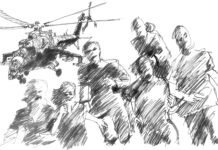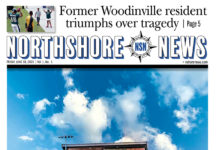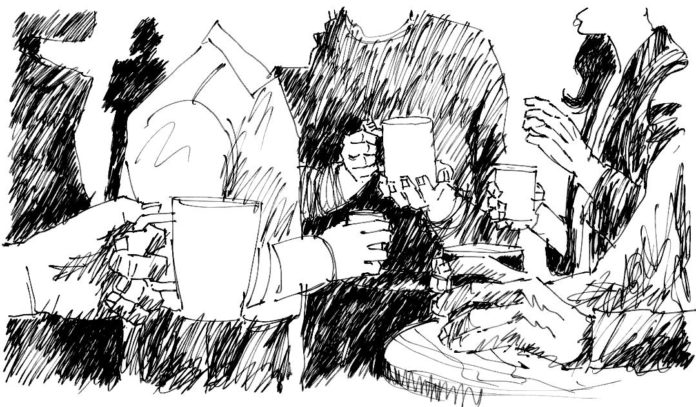This is the initial installment of a new column titled “Ted Talk…,” authored by local design guru Ted Leonhardt. His column will alternate with Rick Stanton’s “Stanton On…” column with each Wednesday’s update of the featured website posts.
Ted also was in the charter class of MARKETING IMMORTALS in 2009. His bio and commentary are featured in the adjacent post (the first in a new series highlighting a different MARKETING IMMORTAL bio and commentary each week), but much has occurred in the intervening two decades since his IMMORTALS induction. Here’s Ted’s update:
By Ted Leonhardt
From free-fall and confusion to sanity and conviction
“The Sig Alert came over the radio. I must have been doing 70 or 80 the 5, heading south in northern California. It was afternoon, but the sky was near black. ‘… this is a Sig Alert. And we repeat: Tornados reported in the Central Valley near Corning…’ I glanced in the mirror and saw the long, dark funnel cross the freeway. Must have been a mile back. Shit. I turned off at the rest stop, grabbed my phone and headed for the concrete-block-built men’s room.
 “My life was in free fall, and so was the climate. Much has occurred since I wrote my IMMORTALS bio and commentary back in 2009. I wrote a book on the struggles creatives face asking for money. Moved out. Started a bi-monthly discussion group for creatives called Mentor Morning. Created a series of negotiation training films. Divorced. Began writing for Fast Company, in addition to marketingnw.com and grew my consulting practice. Bought the lovely De Anza III, a 1959 Western Craft 65-foot motor yacht moored in Ballard. Moved my consulting practice to the boat. Fell in love and married Robin.
“My life was in free fall, and so was the climate. Much has occurred since I wrote my IMMORTALS bio and commentary back in 2009. I wrote a book on the struggles creatives face asking for money. Moved out. Started a bi-monthly discussion group for creatives called Mentor Morning. Created a series of negotiation training films. Divorced. Began writing for Fast Company, in addition to marketingnw.com and grew my consulting practice. Bought the lovely De Anza III, a 1959 Western Craft 65-foot motor yacht moored in Ballard. Moved my consulting practice to the boat. Fell in love and married Robin.
“Today I continue to write and illustrate my stories. I’m fascinated with the idea of starting a creative co-op to band creatives together—to gain better work, more money and more clout. All with less anxiety. And I look forward to sharing other subjects with visitors to the site on a bi-weekly basis.
“I’ve had a long career as a creative professional. The IMMORTALS commentary in 2009 begins with the dawning of my awareness that a life using my creative skills was possible, and ends with the founding of The Leonhardt Group.” The above brings you up to date.
“The climate still is in free fall, but my life isn’t.”
Pub. Note: Ted’s popular Mentor Mornings are held two Saturdays a month from 10am to noon at various locations, including on his boat. Admission is $20 and space is limited. An RSVP is required. For information, visit https://tedleonhardt.com/worth-it/mentor-mornings/
•
The case for a creative co-op. The co-op movement is alive and well in the Seattle area. REI and PCC Community Markets are two famously thriving locally based co-ops. Credit unions also are thriving. Seattle’s own BECU is the fourth largest in the nation. And co-ops are thriving in the U.S. according to the recently published Everything For Everybody, by Nathan Schneider. But are creative co-ops a possibility?
The situation. Today, corporate clients receive creative services from a large number of freelance individuals and small firms. Something like 40% of the U.S. workforce is now freelancers or independent contractors. This is the gig economy.
Creative services traditionally include design, writing, illustration, photography and video or film. Additional specialties include graphic design, product or industrial design, package design, advertising, brand design, planning and strategy, video production and editing, positioning, messaging, user experience (UX) design and user interface (UI) design. And now we’re seeing social media and data analytics added to the mix.
The upside of this structure is the independence of working your own hours and being in control of your work life. The downside is maintaining a steady flow of income. When independent and freelance creatives are engaged on a client assignment, they’re often so busy meeting the needs of that project that they have no time to search for their next client. And when a project needs more than one set of skills or is too large for one creative to complete alone, it’s often difficult to quickly find qualified talent to help out.
Clients pit individual creatives against each other in search of the lowest cost. Clients are the sole source of income for freelancers, so they have all the power in the relationship. And, of course, they can hire and fire (i.e., not hire) at will.
The possibilities. I’d like to explore forming a creative co-op, owned by the workers and managed in a cooperative, democratic manner. The co-op would bill the clients and pay members established hourly fees for the services provided. Clients would pay a service fee on top of the project fees, to cover the co-op’s operations and a profit. Profits would be paid to workers based on their contributions.
The co-op would offer as wide an array of creative services as possible. Certainly it would begin small, perhaps in a niche, but it could expand rapidly as the sales and marketing efforts ramped up. Member owners would be in a contract relationship with each other, so an individual couldn’t legally work for co-op clients on their own. Better than that, I’d hope members would know it’s in their best interest to stay in good stead with the co-op. They own it, after all. And since all client work would be paid in advance, the co-op would pay members instantly for work performed—something freelancers don’t often get —and distribute profit quarterly.
I would expect that members would finance the startup effort; it shouldn’t be expensive. We’d need some advice from professional co-op people, some legal to get the agreements in order, a bookkeeping service and some software to track project costs. Also, some donated time for branding ourselves, creating a website, PR, social media and so on. Later, with some size, we could consider an office and a nice workspace where members could meet or collaborate.
The creative co-op would market on behalf of its members, with the goal of finding large projects that would require the services of multiple co-op members with a variety of skills. With success, the co-op could become the equivalent of a large employer, rivaling the advertising holding companies and management consultancies.
Interested? You can reach Ted at ted@tedleonhardt.com






